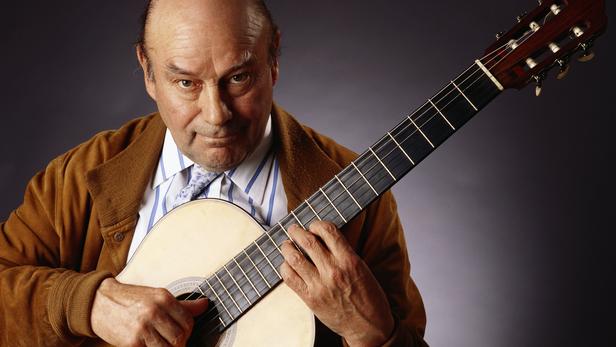The Live from London festival of vocal music is underway!
Live from London, a new online festival of choral music performed by some of the leading choirs and vocal ensembles from the UK and beyond, held its inaugural concert last week at the Voces8 Centre – St Anne and St Agnes Church in the City of London.
Gramophone is delighted to be a Media Partner of Live from London, which was opened by Voces8 – the ensemble behind the festival – themselves, with a programme of works from their new album ‘After Silence’. You can watch highlights from the concert, which was beautifully performed and filmed in HD, below.

Studie der Charité Berlin weckt Hoffnung für den Konzertbetrieb
Basierend auf aktuellen wissenschaftlichen Erkenntnissen sowie Gesprächen mit Musikern und Instrumentenexperten hat die Berliner Charité ihre Studie von Anfang Mai aktualisiert. Darin ging es um das Zusammenspiel von Orchestern und die Sicherheit von Musikern während der Corona-Pandemie. Der neuen Studie zufolge wird den Streichern nun ein Stuhlabstand von einem Meter (bisher 1,5 m) und den Bläsern von 1,5 Metern (bisher 2 m) empfohlen. Darüber hinaus sei ein Plexiglasschutz für die Bläser nicht mehr notwendig und könne entfallen.
„Auf Basis unserer ursprünglichen Stellungnahme haben viele Orchester im Mai 2020 den Spielbetrieb wieder aufgenommen, sehr erfolgreich und ohne Corona-Zwischenfälle. Mit den jetzt aktualisierten Empfehlungen erfolgt der nächste wichtige Schritt zur Normalisierung des Konzert-und Opernbetriebs in Deutschland“, so äußerte sich Prof. Stefan Willich, Direktor des Instituts für Sozialmedizin, Epidemiologie und Gesundheitsökonomie an der Charité. Auch sagte er, dass aufgrund der Disziplin des Publikums eine Vollbesetzung der Konzertsäle unter Einhaltung der Maskenpflicht wieder möglich sei. Ebenso sollten für das Publikum Klimaanlagen mit angemessener DIN-Norm betrieben, bei Umluftbetrieb ein HEPA-Filter eingesetzt (High Efficiency Pariculate Air Filter) oder alternativ regelmäßig durchgelüftet werden.
Allerdings stellte noch am gleichen Tag der Vorstand der Charité auf Twitter klar, dass diese Aussage nicht seiner Position entspreche. Die neue Studie berücksichtige nicht die aktuelle Dynamik des Infektionsgeschehens und sei deshalb nicht als Handlungsvorschlag sondern lediglich als Diskussionsgrundlage zu betrachten.

Study by Charité Berlin raises hope for the concert business
Based on current scientific findings and discussions with musicians and instrument experts, the Berlin Charité has updated its study from the beginning of May. The study focused on the interaction between orchestras and the safety of musicians during the corona pandemic. According to the new study, a chair distance of one meter (previously 1.5 m) is now recommended for string players and 1.5 meters (previously 2 m) for wind players. In addition, Plexiglas protection for the wind players is no longer necessary and can be omitted.
“Based on our original statement, many orchestras resumed playing in May 2020, very successfully and without corona incidents. With the now updated recommendations, the next important step towards the normalization of concert and opera operations in Germany has been taken,” said Prof. Stefan Willich, Director of the Institute for Social Medicine, Epidemiology and Health Economics at the Charité. He also said that, due to the discipline of the audience, it would again be possible to fill the concert halls to full capacity while observing the obligation to wear masks. Likewise, air conditioning systems for the audience should be operated in accordance with appropriate DIN standards, a HEPA filter (High Efficiency Pariculate Air Filter) should be used for recirculation mode, or alternatively, the auditorium should be ventilated regularly.
However, on the same day, the Charité board of directors made it clear on Twitter that this statement did not correspond to its position. The new study does not take into account the current dynamics of the infection and should therefore not be regarded as a proposal for action but only as a basis for discussion.
Mort du guitariste britannique Julian Bream à l’âge de 87 ans
La guitare perd l’un de ses plus grands alliés dans le monde de la musique classique. Julian Bream, talentueux musicien britannique est décédé vendredi à son domicile dans le Wiltshire, un comté du sud-ouest de l’Angleterre. Il avait 87 ans. é à Battersea près de Londres, il découvre la musique grâce à son père.
Plus tard, il entre au Royal College of Music de Londres où il étudie le piano et le violoncelle. Il devient ensuite l’élève du grand guitariste classique espagnol Andrés Segovia.
À la différence de Segovia qui mettait sa guitare au service de ses influences latino-américaines, Bream s’est orienté vers les œuvres classiques européennes. Il a ainsi transcrit des partitions de Bach, Schubert, Domenico Scarlatti ou encore Henry Purcell. De nombreux compositeurs ont également écrit pour lui, tels que Benjamin Britten ou Malcolm Arnold.

British guitarist Julian Bream has died at the age of 87
The guitar loses one of its greatest allies in the world of classical music. Julian Bream, a talented British musician died Friday at his home in Wiltshire, a county in the southwest of England. He was 87 years old.
Born in Battersea near London, he discovered music thanks to his father.
Later, he entered the Royal College of Music in London where he studied piano and cello. He then became a pupil of the great Spanish classical guitarist Andrés Segovia.
Unlike Segovia, who used his guitar in the service of his Latin American influences, Bream turned towards European classical works. He transcribed scores by Bach, Schubert, Domenico Scarlatti and Henry Purcell. Many composers also wrote for him, such as Benjamin Britten or Malcolm Arnold.
 BACK
BACK